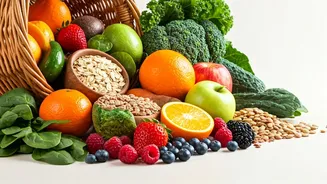Fiber's Crucial Role
Fiber, an indigestible component of plant-based foods, is a cornerstone of gut health. It promotes regularity, feeds beneficial gut bacteria, and assists
in preventing various health issues. Gastroenterologists emphasize its significance in a balanced diet. Fiber helps manage blood sugar levels, which is crucial for individuals with diabetes, and also contributes to maintaining a healthy weight by promoting satiety. There are two primary types of fiber: soluble and insoluble. Soluble fiber dissolves in water, forming a gel-like substance that aids in slowing digestion and lowering cholesterol levels. Insoluble fiber, on the other hand, adds bulk to the stool, helping to prevent constipation and promote regular bowel movements. Adequate fiber intake is associated with a reduced risk of heart disease, type 2 diabetes, and certain cancers. Making a conscious effort to include fiber-rich foods in your diet is a simple yet impactful way to improve your overall health and well-being.
Apples: Fiber Powerhouse
Apples are not just a delicious fruit; they are a rich source of fiber, particularly pectin, a soluble fiber that supports gut health. Consuming an apple with its skin on provides a good amount of fiber, contributing to feelings of fullness and aiding in weight management. Pectin aids in regulating blood sugar levels and can help lower cholesterol. Furthermore, apples also contain antioxidants that protect against cellular damage, contributing to overall health. Incorporating apples into your diet is easy; enjoy them as a snack, add them to your salads, or bake them into desserts. One medium apple (around 182 grams) contains approximately 4.4 grams of fiber, making it a valuable addition to your daily fiber intake. The convenience and versatility of apples make them an accessible and effective way to support your gut health and overall wellness, contributing to a robust digestive system.
Berries: Nutrient Boosters
Berries, including blueberries, raspberries, and strawberries, are packed with both soluble and insoluble fiber, making them an excellent choice for gut health. These small fruits offer a significant fiber punch along with a wealth of antioxidants and vitamins. The fiber in berries supports regular bowel movements, preventing constipation and improving digestion. Furthermore, berries are low in calories and high in nutrients, contributing to a healthy weight and overall well-being. Consuming berries regularly can contribute to a more diverse and balanced gut microbiome, which is essential for optimal health. They also provide antioxidants, protecting your body from free radicals and reducing the risk of chronic diseases. Adding berries to your diet is simple; enjoy them in smoothies, as a topping for yogurt, or as a standalone snack. A cup of raspberries, for instance, contains about 8 grams of fiber, while a cup of blueberries provides approximately 3.6 grams, easily boosting your daily fiber intake.
Lentils: Protein & Fiber
Lentils are a nutritional powerhouse, offering a great combination of fiber and plant-based protein, which makes them highly beneficial for gut health. Lentils are a source of both soluble and insoluble fiber, which promotes regular bowel movements and feeds beneficial gut bacteria, and are also an excellent source of prebiotics, which fuels the healthy bacteria in your gut. They assist in blood sugar regulation and keep you feeling fuller for longer, which can help with weight management. Lentils are also a good source of iron, which is essential for transporting oxygen throughout the body. Incorporating lentils into your diet is easy and versatile; they can be added to soups, stews, salads, or served as a side dish. One cup of cooked lentils (approximately 198 grams) offers about 15.6 grams of fiber, making them a significant contributor to your daily fiber goals. Their affordability and ease of preparation make lentils a practical and effective way to improve your gut health and overall dietary balance, contributing to a robust digestive system and overall well-being.
Broccoli: Green Fiber Champion
Broccoli is a cruciferous vegetable known for its high fiber content and various health benefits, making it an excellent addition to any diet focused on gut health. This versatile vegetable provides both soluble and insoluble fiber, which supports healthy digestion and regular bowel movements. Broccoli also contains glucosinolates, which support detoxification processes and potentially reduce the risk of certain cancers. Its high fiber content contributes to feeling full, aiding in weight management, and can help maintain steady blood sugar levels. Broccoli is also rich in vitamins and minerals, providing essential nutrients that support overall health. Whether steamed, roasted, or added to salads and stir-fries, broccoli offers a wealth of nutritional benefits. A cup of chopped, cooked broccoli (approximately 156 grams) contains about 5.1 grams of fiber, making it a valuable contributor to your daily fiber intake and offering diverse ways to support your gut health, enhancing digestive wellness.






















